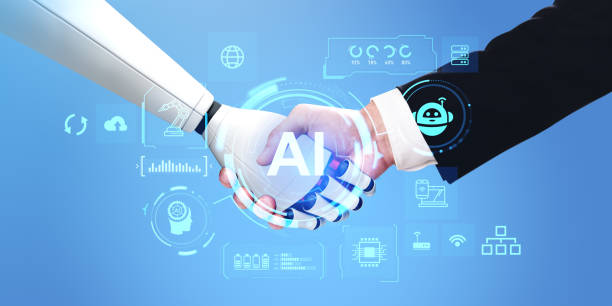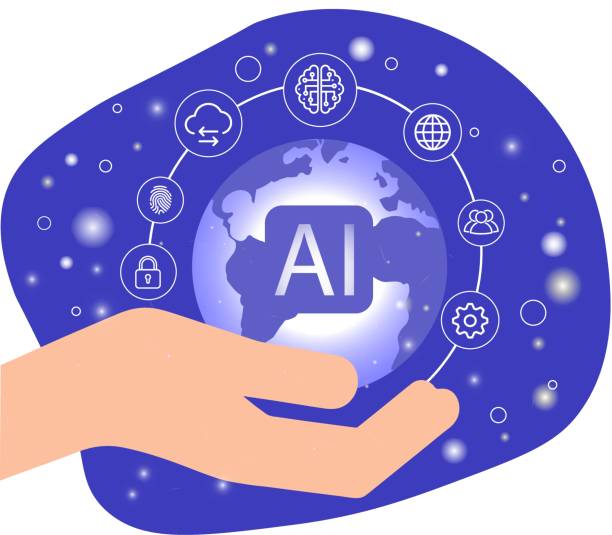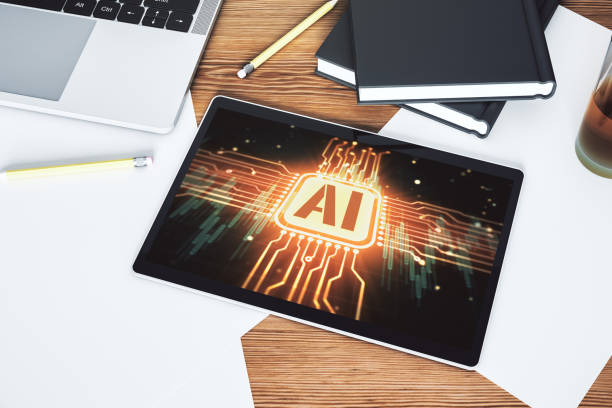What is an AI Assistant and what are its applications?

#AI_Assistant (Artificial Intelligence Assistant) is a computer program designed using Artificial Intelligence to perform various tasks automatically or with minimal human intervention.
These assistants can help users in diverse areas including answering questions, time management, content creation, language translation, and even aiding in decision-making.
#Smart_Assistants actually strive to increase efficiency and ease in performing tasks by mimicking human behavior and cognition.
One of the key features of an AI assistant is its ability to learn and improve performance over time.
By analyzing data and received feedback, they identify patterns and, as a result, provide more accurate responses and suggestions.
Using an AI assistant can lead to saving time and costs, increasing productivity, and improving user experience.
For example, an #AI_Assistant can help a marketing team design more effective advertising campaigns by analyzing customer data.
Or another AI assistant can help a doctor provide a more accurate diagnosis by reviewing patients’ medical records.
In summary, an AI assistant is a powerful tool that can help humans in various fields to perform tasks more effectively and efficiently.
#AI_Assistant, with its extensive capabilities, plays a significant role in digital transformation.
Falling behind in competition with large online stores?
Rasab Web makes your business online with professional e-commerce website design and increases your market share!
✅ Increased brand credibility and customer trust
✅ Easy shopping experience leading to more sales
⚡ Act now to receive a free website design consultation!
What are the different types of AI assistants?

AI assistants can be divided into different categories based on their application type, platform, and capabilities.
Some of the most common types of AI assistants include voice assistants like Google Assistant, Amazon Alexa, and Apple Siri, which interact with users via voice and can execute voice commands.
These assistants are typically installed on smart devices such as mobile phones, smart speakers, and cars.
Another category of AI assistants are chatbots, which communicate with users via text.
Chatbots are commonly used on websites, messaging apps, and social networks for providing customer service, answering frequently asked questions, and conducting online transactions.
In addition, there are specialized AI assistants designed to perform specific tasks.
For example, AI assistants in the medical field can help doctors in diagnosing diseases, planning treatment, and managing patients.
In the financial sector, AI assistants can help investors in market analysis, portfolio management, and conducting transactions.
AI assistants are becoming more useful every day.
Choosing the appropriate type of AI assistant depends on the user’s needs and goals.
Important Criteria for Choosing the Right AI Assistant

Choosing the right AI assistant requires considering various criteria.
The first criterion is the assistant’s compatibility with the user’s needs and goals.
It should be evaluated whether the assistant can effectively perform the tasks the user intends to accomplish.
The second criterion is the assistant’s reliability and accuracy.
It must be ensured that the assistant provides accurate and reliable responses and prevents errors.
The third criterion is the ease of use and user interface of the assistant.
The assistant should have a simple and understandable user interface so that users can easily interact with it.
The fourth criterion is data security and privacy.
It must be ensured that the assistant securely protects user data and does not use it for unauthorized purposes.
The fifth criterion is the cost of using the assistant.
It should be evaluated whether the cost of using the assistant is compatible with the user’s budget.
#AI_Assistant must be chosen carefully.
By considering these criteria, users can choose the appropriate AI assistant for themselves and benefit from its advantages.
| Criterion | Description |
|---|---|
| Compatibility with Needs | Does the assistant effectively perform the desired tasks? |
| Reliability and Accuracy | Does the assistant provide accurate and reliable responses? |
| Ease of Use | Is the assistant’s user interface simple and understandable? |
| Security and Privacy | Does the assistant securely protect user data? |
| Cost | Is the cost of using the assistant compatible with the user’s budget? |
How to Use AI Assistants to Increase Productivity

AI assistants can help increase productivity in various ways.
One way is by automating repetitive and time-consuming tasks.
For example, an AI assistant can filter emails, schedule meetings, and prepare reports.
Another way is by providing relevant and timely information and suggestions.
For example, an AI assistant can track industry-related news for the user, provide alerts about market changes, and offer performance improvement suggestions.
Furthermore, AI assistants can help improve communication and collaboration.
For example, an AI assistant can provide real-time translation, perform automatic note-taking, and prepare meeting summaries.
To effectively use an AI assistant, users must first identify their needs and goals.
Then, they should choose an appropriate assistant that aligns with their needs and goals.
Finally, they must configure the assistant correctly and learn how to use it to fully leverage all its capabilities.
By correctly using an #AI_Assistant, users can significantly increase their productivity.
Did you know that poor online store design can drive away up to 70% of your potential customers? Rasab Web revolutionizes your sales with professional and user-friendly e-commerce website designs.
✅ Significant increase in sales and revenue
✅ Full optimization for search engines and mobile devices
⚡ [Get a free consultation from Rasab Web]
Challenges and Limitations of Using AI Assistants

Despite numerous advantages, the use of AI assistants also comes with challenges and limitations.
One of the challenges is over-reliance on AI assistants.
Users should be aware that an AI assistant is a tool designed to help them, not to replace them.
Another challenge is the accuracy and reliability of the assistant.
AI assistants are not yet perfect and may sometimes make mistakes or provide incorrect information.
Users should always verify the information provided by the assistant and ensure its accuracy.
Another limitation is data privacy.
AI assistants require user data to provide their services.
Users should be aware of the assistant’s privacy policies and refrain from providing sensitive information.
Furthermore, AI assistants may lack creativity and critical thinking abilities.
They typically operate based on existing patterns and data and cannot make decisions in new and complex situations.
#AI_Assistant faces limitations that users should be aware of.
By being aware of these challenges and limitations, users can use AI assistants responsibly and safely.
The Future of AI Assistants

The future of AI assistants looks very bright.
With continuous advancements in the field of artificial intelligence, AI assistants are expected to be able to perform more complex tasks and provide better services to users in the future.
One of the significant trends in the future of AI assistants is increased personalization.
In the future, AI assistants will be able to provide more personalized services and suggestions by learning more deeply about users.
Another trend is the increase in multimodal interactions.
In the future, AI assistants will be able to interact with users through voice, image, text, and other communication methods.
Furthermore, AI assistants are expected to play a more significant role in our daily lives in the future.
They can help us in various fields including education, healthcare, transportation, and entertainment.
However, the development of AI assistants also requires attention to ethical and social issues.
It must be ensured that AI assistants operate fairly and without discrimination, and protect users’ rights and freedoms.
#AI_Assistant will play a significant role in the near future.
Comparison of AI Assistants Available in the Market

The AI assistant market is full of various options, each with unique features and capabilities.
Choosing the best option can be challenging.
Here, we compare some of the most popular AI assistants. Google Assistant is known for its strong integration with the Google ecosystem and its ability to answer complex questions.
Amazon Alexa is popular for its compatibility with a wide range of smart devices and its ability to control smart homes.
Apple Siri is famous for its integration with Apple devices and its focus on user privacy.
In addition to these major assistants, there are also specialized AI assistants designed to perform specific tasks.
For example, Grammarly helps users write error-free texts, and Otter.ai is used for automatic transcription of voice conversations.
Choosing the best AI assistant depends on the user’s needs and priorities.
If you are looking for a smart assistant with extensive capabilities and strong integration with the Google ecosystem, Google Assistant is a good option.
If you are looking for a smart assistant to control your smart home, Amazon Alexa is a suitable option.
And if you are looking for a smart assistant with a focus on privacy, consider Apple Siri.
#AI_Assistant depends on each person’s choice and needs.
| Assistant Name | Features | Strengths | Weaknesses |
|---|---|---|---|
| Google Assistant | Google integration, answering complex questions | Extensive capabilities | Privacy concerns |
| Amazon Alexa | Compatibility with smart devices, smart home control | Smart home control | Response quality |
| Apple Siri | Apple device integration, privacy | Privacy | Limitations in capabilities |
Key Tips for Maintaining Security and Privacy When Using AI Assistants

Maintaining security and privacy is very important when using AI assistants.
Users should be aware that AI assistants have access to their data and must take necessary measures to protect this data.
One of the key tips is to review the assistant’s privacy policies.
Before using the assistant, users should carefully read its privacy policies and become aware of how their data is collected, used, and shared.
Another tip is to limit the assistant’s access to data.
Users should restrict the assistant’s access to unnecessary data and refrain from providing sensitive information.
Furthermore, users should choose strong passwords for their accounts and enable two-factor authentication.
It is also recommended that users regularly review the assistant’s activities and report any suspicious activity.
#AI_Assistant can provide more security for you with these tips.
By following these key tips, users can maintain their security and privacy when using AI assistants.
Are your online sales not as you expected? With Rasab Web, solve the problem of low sales and poor user experience forever!
✅ Increase conversion rate from visitor to customer
✅ Create a pleasant user experience and boost customer trust
⚡ Act now to receive a free consultation!
The Impact of AI Assistants on Jobs and the Job Market

The impact of AI assistants on jobs and the job market is a complex and controversial topic.
Some experts believe that AI assistants will lead to the elimination of many jobs, while others argue that they will create new ones.
The reality is that the impact of AI assistants on jobs and the labor market depends on various factors, including the pace of technological advancement, the rate of technology adoption by businesses, and government policies regarding education and employment.
Generally, AI assistants are expected to automate many repetitive and time-consuming tasks.
This could lead to a decrease in demand for certain jobs, especially those requiring low skills.
On the other hand, AI assistants can create new job opportunities, especially for roles requiring high skills.
For example, demand for AI specialists, data scientists, and software engineers is expected to increase.
Furthermore, AI assistants can help individuals learn new skills and get hired in new professions.
#AI_Assistant causes changes in the job market that should be noted.
To address the challenges posed by automation, governments and businesses must increase investment in education and training, and create support programs for unemployed individuals.
How to Train and Improve Your AI Assistant?

AI assistants operate based on data and algorithms, so training and improving them requires providing sufficient data and adjusting algorithms.
One way to train an AI assistant is by providing feedback to it.
When the assistant gives an incorrect answer or fails to perform a task correctly, users should provide their feedback to it.
This feedback can help the assistant learn from its mistakes and improve its performance.
Another way is to use training data.
Training data is a collection of data used to train an AI assistant.
This data can include text, images, audio, and video.
The more accurate and comprehensive the training data, the better the AI assistant can learn and perform.
Additionally, users can improve the performance of an AI assistant by adjusting its algorithms.
This task is usually performed by AI specialists.
Overall, training and improving an AI assistant is a continuous process that requires effort and collaboration from users and AI specialists.
#AI_Assistant, like a human, needs learning and improvement.
#AI_Assistant, with its feedback and training, can perform more efficiently than ever and significantly help you with tasks.
Proper use of an #AI_Assistant requires sufficient information about its functionality and limitations.
#AI_Assistant can help you in various fields such as medicine, marketing, and finance.
Frequently Asked Questions
| Row | Question | Answer |
|---|---|---|
| 1 | What is an AI assistant? | It is a software program that performs tasks or services for an individual based on verbal or textual commands. |
| 2 | Name a few examples of AI assistants? | Siri, Google Assistant, Alexa, and Cortana. |
| 3 | How do AI assistants work? | They use Natural Language Processing (NLP), machine learning, and AI to understand user input and provide responses or perform tasks. |
| 4 | What can an AI assistant do? | Answer questions, set reminders, play music, send messages, manage calendars, and control smart devices. |
| 5 | What are the benefits of using an AI assistant? | Increased productivity, quick access to information, assistance for individuals with special needs, and simplification of daily tasks. |
| 6 | Are AI assistant responses always accurate? | No, they may sometimes make mistakes or provide outdated information, especially concerning complex or sensitive topics. |
| 7 | What are the privacy concerns regarding AI assistants? | Recording and storing voice/text data, potential unauthorized access, and using data for advertising purposes. |
| 8 | What will the future of AI assistants be like? | Becoming smarter, greater integration with devices and platforms, deeper understanding of emotions, and the ability to perform more complex tasks. |
| 9 | Do AI assistants learn from users? | Yes, through machine learning and data collection from previous interactions to improve performance and personalize responses. |
| 10 | What is the difference between an AI assistant and a chatbot? | An AI assistant has the ability to perform a wider range of tasks beyond conversation and is often integrated with an operating system or hardware, while a chatbot is primarily designed for conversation or answering specific questions. |
And other advertising services from Rasab Web Advertising Agency
- Smart Reportage: Professional optimization for campaign management using attractive UI design.
- Smart Direct Marketing: Designed for businesses seeking to improve SEO ranking through custom programming.
- Smart Brand Identity: A professional solution for campaign management focusing on using real data.
- Smart Customer Journey Map: A fast and efficient solution for digital branding focusing on Google Ads management.
- Smart Custom Software: A professional solution for analyzing customer behavior with a focus on SEO-driven content strategy.
And over hundreds of other services in the field of internet advertising, advertising consultation, and organizational solutions
Internet Advertising | Advertising Strategy | Sponsored Articles
Sources
Comprehensive Guide to AI Assistants
Important Tips for Choosing an AI Assistant
Applications of Smart Assistants in Daily Life
The Future of AI Assistants and Advancements
? To elevate your business in the digital space and reach the peaks of success, custom website design and comprehensive digital marketing services with Rasab Afarin.
📍 Tehran, Mirdamad Street, next to Bank Markazi, Southern Kazeroon Alley, Ramin Alley, No. 6



